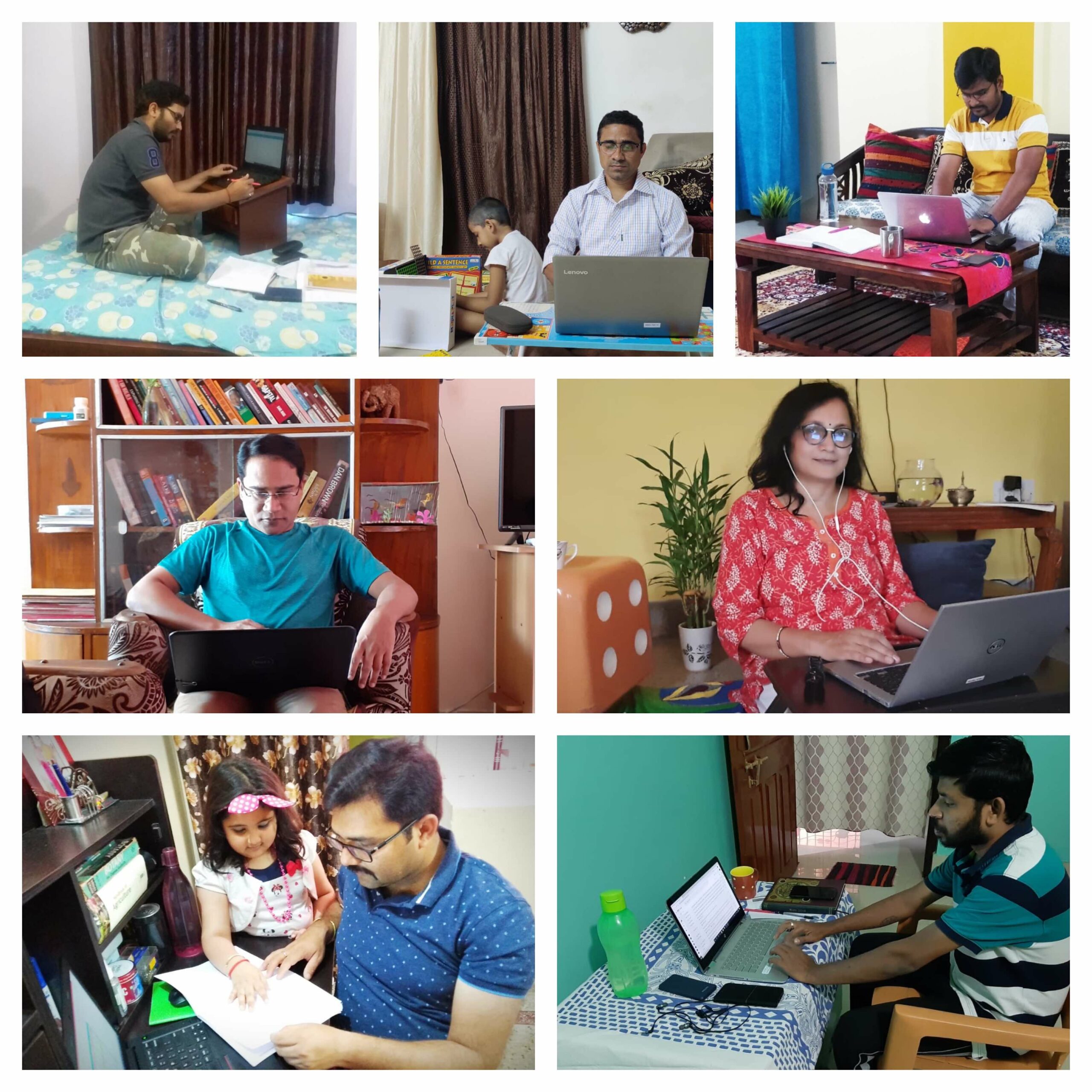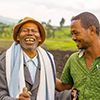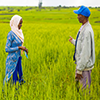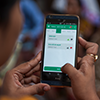COVID-19 is creating challenges for our day-to-day project implementation plans, in particular, how we work with farmers. Digital Green established task forces in its India and Ethiopia country offices to explore how we can adapt our approaches and leverage technologies to communicate vital information amidst social distancing and lockdowns and to support smallholder farmers in coping with the economic impacts of COVID-19.
The task forces shared the following innovations they are implementing to support farmers under the unprecedented challenges of this pandemic.
Surveys to understand farmer needs
Digital Green is collaborating with its government partners in India to gather ground-level data via phone and WhatsApp surveys. The goal is to survey 800 farmers (200 each in AP, Bihar, Jharkhand, and Odisha) and provide government agencies with information to help them to proactively respond and prevent agricultural shocks and food security issues. Key questions in the survey include the challenges around the completion of the Rabi crop harvest, crops and acreage planned for Kharif crops, and inputs needed for the Kharif season.
Similarly, in Ethiopia, Digital Green conducted rapid phone and interactive voice response (IVR) surveys to gather data on agriculture and health/nutrition-related needs. In collaboration with the Ministry of Agriculture Extension Directorate and Agricultural Transformation Agency, the collected data will be used by government partners to target extension advisories, as well as inform policies and decisions to modify agricultural programs.
Results from the survey in Ethiopia, which reached 200 farmers in four regions, identified the following challenges: (1) While farmers are aware of COVID-19, there is a need to reinforce messaging about preventive measures such as social distancing. (2) Limited transport services, market closures, and travel restrictions are disturbing market access. (3) Farmers are concerned about their ability to access quality inputs and receive services from unions/cooperatives. (4) Farmers expect planting delays due to lack of inputs and a shortage of labor. (5) Locust swarms are destroying harvests and imperiling the upcoming planting season. (6) Farmers are concerned about limited opportunities to work together, support each other, share experiences, and learn from videos.
Integrating digital channels of content delivery
The survey in Ethiopia conducted by Digital Green revealed that 88% of respondents listen to agriculture programs on the radio and identified it as the most accessible information channel, followed by phone audio messages (51%) and text messages (37%). Only 9% of respondents have both a smartphone and access to the internet and use mobile apps. Based on these findings, Digital Green is prioritizing radio, IVR and SMS as communication channels that do not require in-person presence for sharing information. Potential content delivery includes information about traders/buyers via IVR on a regular schedule, digitally linking farmers with potential buyers in collaboration with local government, providing digital extension information (agronomic and livestock handling practices), and early warning information regarding weather, disease and pest outbreaks.
Supporting market linkages
In India, Digital Green launched a directory to help buyers discover local smallholder farmers with available produce. This responds to concerns from farmers near Bangalore, whose crops were going to waste on the farm given that the traditional markets (mandis) were disrupted by the lockdown. This directory helps create market linkages, prevent crop loss, support food security, and ensure farmers are still able to sell their crops.
Also in India, Digital Green is evaluating ideas for new products and services that build on our existing solutions and helps smallholder farmers increase income and realize operational excellence in a commercially viable, scalable manner. We are exploring themes like marketplaces, traceability of produce, and agronomic advisory services.
Direct support to partners
As noted above, the surveys are not only providing valuable information on farmers’ needs and how to best address those, but the results are shared with government partners in order to support their efforts to address the impacts of COVID-19 on agriculture.
Our government partners are requesting support to ramp up their digital responses for example (1) provision of remote/virtual training on new technologies and practices; (2) co-funding for radio, poster production, microphones and fuel and other means to broadcast public health messages in villages, as well as personal protective equipment for extension staff and laborers; and (3) financial support to cover content production and broadcast costs to reach farmers with agricultural messaging using regional radio.
How are you and your organization supporting and reaching farmers during this pandemic? If you see opportunities to collaborate with Digital Green, please reach out to us too! Share your ideas and feedback at covid19@digitalgreen.org


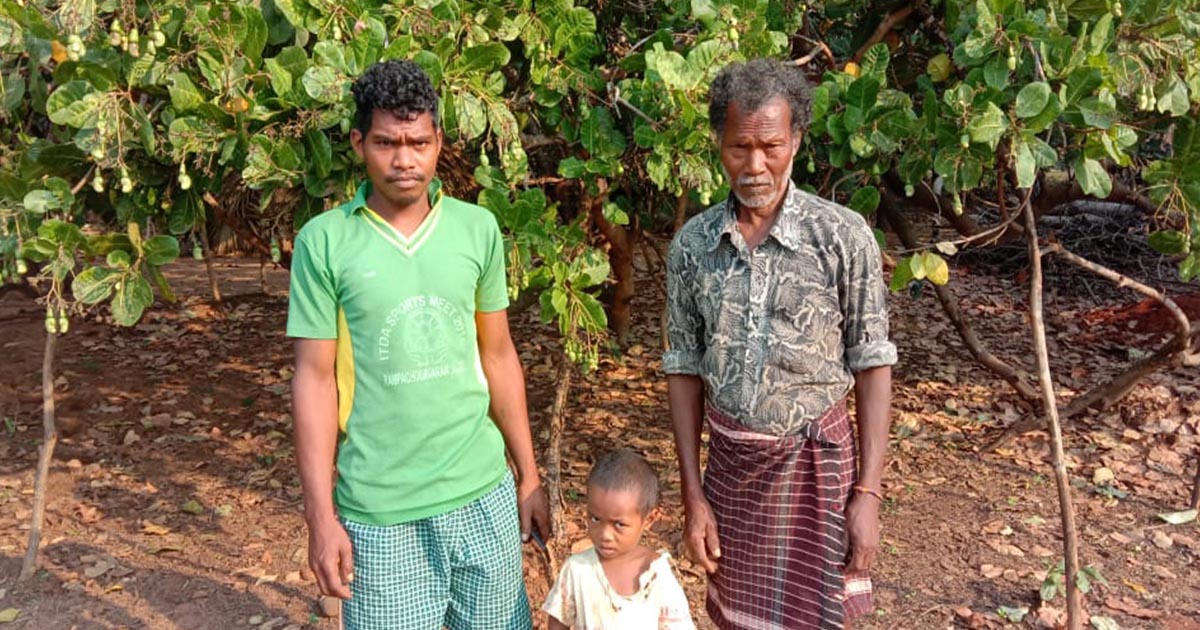

 eputy Program Manager: Since the beginning of the pandemic, I have been following the updates and been worried about my family’s health. As both my wife (Srilatha) and I travel frequently for work, we were worried that we may carry the virus home. Luckily, both our organizations have allowed us the option to work from home even before the Government of India took the decision to lock down the country for 21 days and that helped us prepare ourselves – arrange internet connection at home, buy groceries, and medicine for our parents.
eputy Program Manager: Since the beginning of the pandemic, I have been following the updates and been worried about my family’s health. As both my wife (Srilatha) and I travel frequently for work, we were worried that we may carry the virus home. Luckily, both our organizations have allowed us the option to work from home even before the Government of India took the decision to lock down the country for 21 days and that helped us prepare ourselves – arrange internet connection at home, buy groceries, and medicine for our parents. Ranga Charyulu, Program Manager: This is a unique experience. My work is mainly in the field and at the partner’s offices and includes frequent travel. I am not used to spending so much time at home. But now we are managing work through our laptops and mobile phones form home. I’ve been keeping in touch with the various partner staff and field functionaries over the phone and we all start our calls by inquiring about each other’s and our families’ wellbeing. Regular contact with our teams, catching up on the situation in and around where we all work and chatting about our families helps set the mood right and keeps our spirits high.
Ranga Charyulu, Program Manager: This is a unique experience. My work is mainly in the field and at the partner’s offices and includes frequent travel. I am not used to spending so much time at home. But now we are managing work through our laptops and mobile phones form home. I’ve been keeping in touch with the various partner staff and field functionaries over the phone and we all start our calls by inquiring about each other’s and our families’ wellbeing. Regular contact with our teams, catching up on the situation in and around where we all work and chatting about our families helps set the mood right and keeps our spirits high.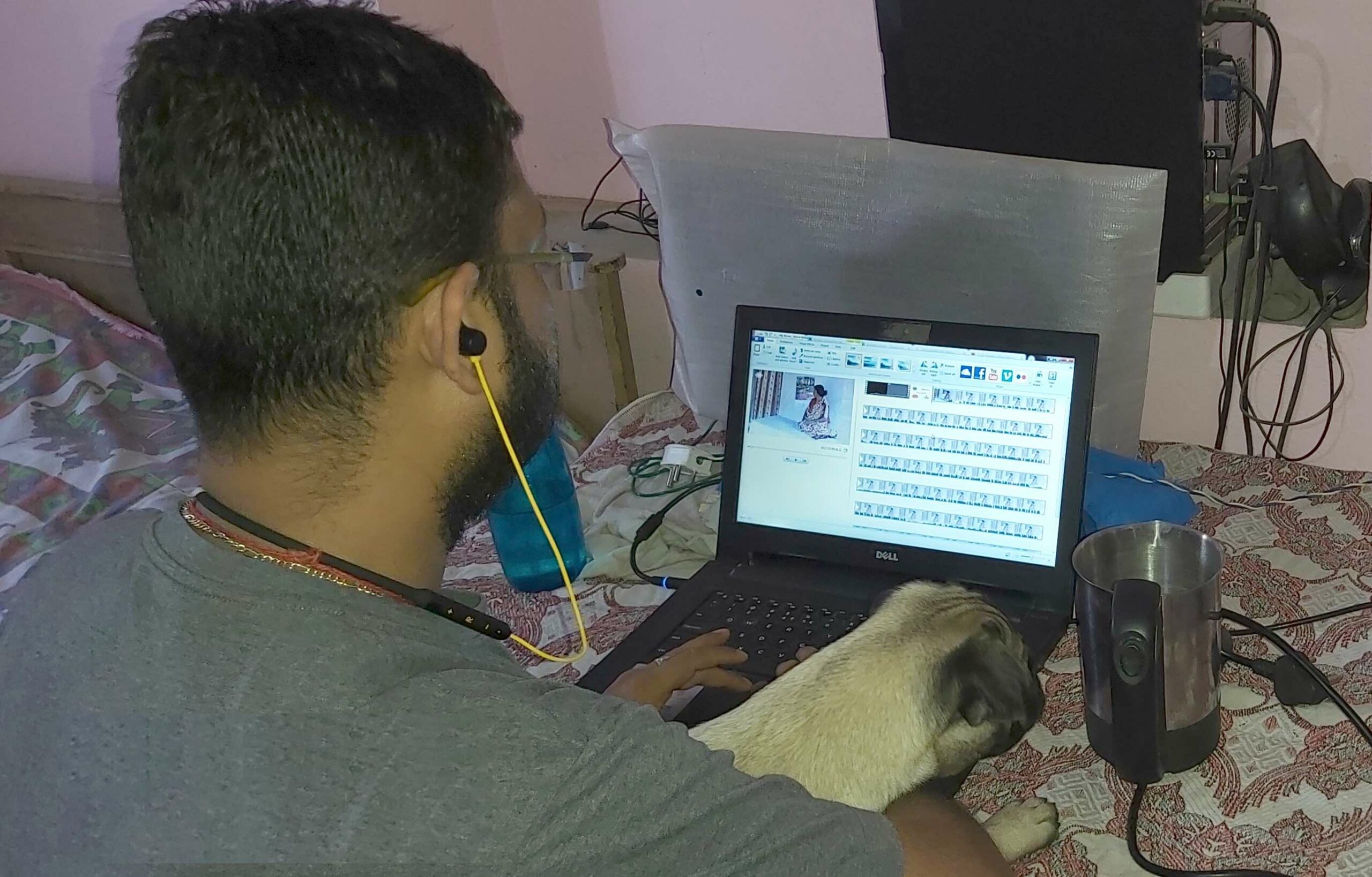 Amitesh Anand, Program Manager: As the whole world goes through this life-changing event how can we be left untouched. For me, working from home is an entirely new concept and I have mixed feelings about it. Initially, I was confused but gradually I got into a schedule much like my usual day when I would go to the office – trying to trick my brain into believing I had that same routine. I would wake at 6:30 AM and leave for my office (room upstairs) by 9:30 AM after having my breakfast and saying goodby to my wife and son, have my lunch at 1:30 PM and come back downstairs at 5:30 PM. This new office is pet friendly 🙂
Amitesh Anand, Program Manager: As the whole world goes through this life-changing event how can we be left untouched. For me, working from home is an entirely new concept and I have mixed feelings about it. Initially, I was confused but gradually I got into a schedule much like my usual day when I would go to the office – trying to trick my brain into believing I had that same routine. I would wake at 6:30 AM and leave for my office (room upstairs) by 9:30 AM after having my breakfast and saying goodby to my wife and son, have my lunch at 1:30 PM and come back downstairs at 5:30 PM. This new office is pet friendly 🙂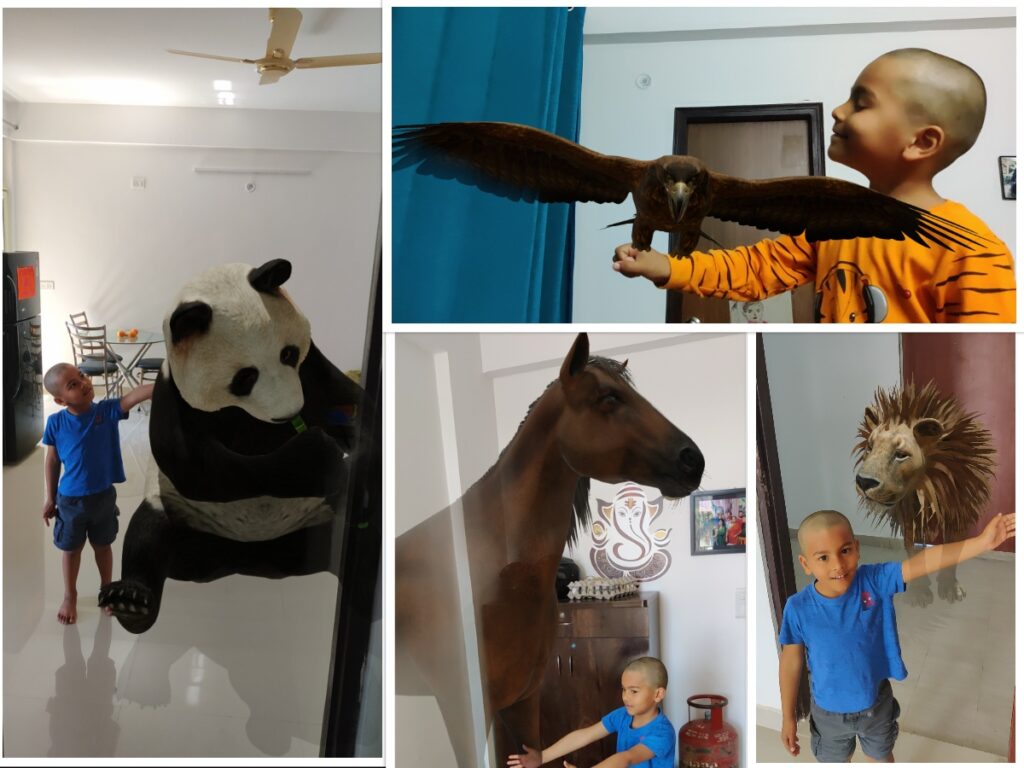
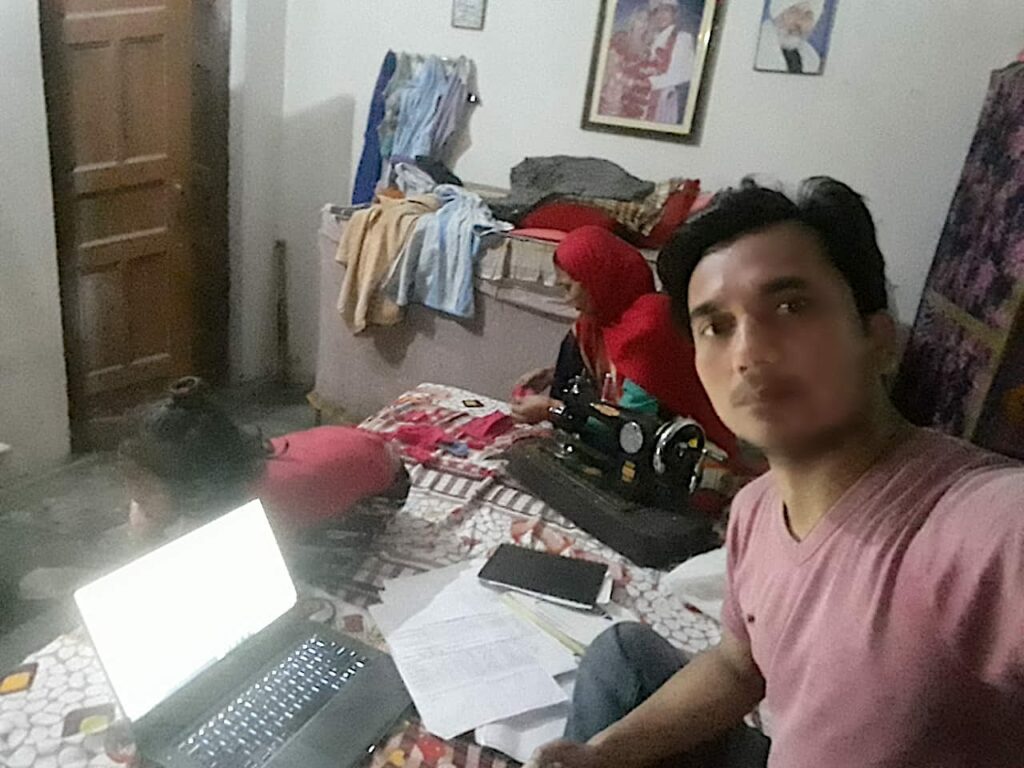 emed very difficult, but now I’m getting into the habit. Most of my work requires in-person meetings with our partners. But everyone’s got to figure out a way to continue doing their work while remaining quarantined. I’m trying to keep in touch with the National Health Mission team members, get regular field updates, manage data entry, etc. Along with this, I am also taking care of myself and my family’s health and hygiene.
emed very difficult, but now I’m getting into the habit. Most of my work requires in-person meetings with our partners. But everyone’s got to figure out a way to continue doing their work while remaining quarantined. I’m trying to keep in touch with the National Health Mission team members, get regular field updates, manage data entry, etc. Along with this, I am also taking care of myself and my family’s health and hygiene.